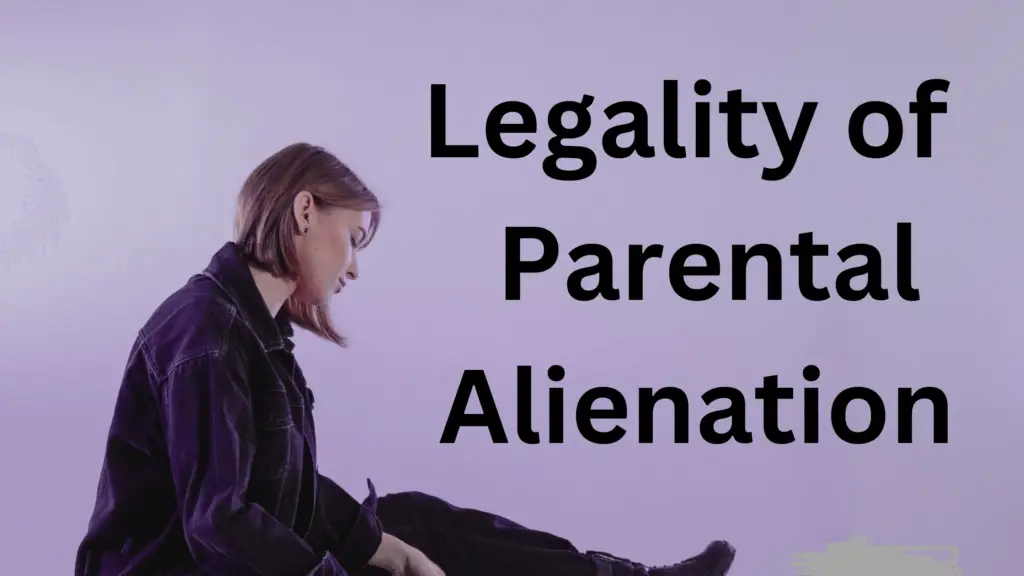Parental alienation is a term that has garnered significant attention in recent years, sparking intense debates and raising concerns among parents, legal experts, and mental health professionals alike. It represents a deeply distressing and emotionally charged phenomenon that occurs within the context of family dynamics, particularly during and after divorce or separation. It is because of this many people seek answers to the question: is parental alienation illegal?
Developing an Understanding of Parental Alienation
Parental alienation extends beyond simple disagreements between co-parents. It encompasses a spectrum of behaviors that are intentionally orchestrated to turn a child against one of their parents. Such behaviors can manifest as derogatory remarks, spreading false information, or even imposing unreasonable restrictions on communication and visitation between the child and the targeted parent. The cumulative effect is an emotional chasm within the family structure, often leading to severe emotional distress for the child and strained relationships all around.
Is Parental Alienation Illegal
The question of whether parental alienation is expressly illegal varies based on jurisdiction. In many instances, specific legal statutes targeting parental alienation are absent from the legal landscape. However, this absence doesn’t render the legal system impotent in addressing this distressing phenomenon. The existing family and child custody laws frequently revolve around safeguarding the best interests of the child, providing a foundation upon which to tackle parental alienation.
So, is parental alienation illegal? No, parental alienation is not a crime in most jurisdictions. However, it can be considered a form of emotional abuse or child neglect, which are both illegal. In some cases, parental alienation may also be considered a violation of a court order, which could lead to criminal charges.
Read About: Can You Call CPS For Parental Alienation
Applicability of Existing Laws
Family courts are primed to ensure the stability and well-being of children in the aftermath of parental separation. The primary objective of custody arrangements is to foster healthy relationships between children and both parents, unless there are compelling reasons to restrict one parent’s involvement. This mandates a constant consideration of the child’s best interests within legal deliberations. Consequently, courts may consider evidence of parental alienation when rendering custody decisions.
Proving Parental Alienation
Challenging the phenomenon of parental alienation in a legal context necessitates the collection of robust evidence that substantiates the presence of alienating behaviors. This could encompass meticulous documentation of derogatory comments, the establishment of communication limitations, and any additional actions that hinder the child’s relationship with one parent. To validate the claims, courts frequently depend on the credibility of allegations and corroboration from experts such as psychologists and therapists. These professionals offer invaluable insights into the psychological toll of parental alienation on children.
Read About: Judges View on Parental Alienation
Jurisdictional Variations
The legal response to parental alienation exhibits considerable diversity across jurisdictions. Different countries adopt distinct legal approaches and interpretations, inevitably leading to varying outcomes. Furthermore, the cultural norms and societal attitudes surrounding family dynamics play an influential role in shaping legal reactions.
Specific Laws Against Parental Alienation
In some countries, such as France and Brazil, explicit legal statutes have been enacted to define and prohibit parental alienation. These laws proffer lucid guidelines for identifying and addressing alienating behaviors, reflecting a proactive legal stance against such practices. Conversely, in countries like the United States and Canada, parental alienation is frequently approached within the existing framework of family laws, resulting in a degree of interpretative flexibility for judges and legal practitioners.

Legal Precedents and Case Studies
An exploration of previous legal cases involving parental alienation affords crucial insights into the operational mechanics of the legal response. In situations wherein concrete evidence of alienating conduct has been presented, courts have taken measures to address the issue head-on. These measures may include the adjustment of custody arrangements to ensure equitable participation from both parents or the prescription of therapeutic interventions aimed at facilitating reconciliation between the child and the targeted parent.
The responsibility of addressing parental alienation rests heavily on the shoulders of judges, lawyers, and child advocates. These legal professionals assume the critical role of evaluating the presented evidence judiciously and making determinations that prioritize the child’s emotional and psychological well-being. Achieving this equilibrium mandates a delicate balance between safeguarding the rights of both parents and ensuring an environment conducive to the child’s healthy development.
Challenges in Addressing Parental Alienation
While the significance of addressing parental alienation cannot be overstated, there exist inherent challenges that must be navigated effectively. One of the most prominent challenges revolves around the ability to differentiate authentic cases of parental alienation from scenarios in which a child’s reluctance to engage with one parent may be attributed to alternative factors, such as personal preferences or the behavior of the parent in question.
Balancing Parental Rights and Child Interests
An additional hurdle lies in harmonizing parental rights with the child’s best interests. While protecting the rights of parents to maintain relationships with their children is vital, an equally crucial consideration is the child’s emotional welfare and stability. Devising appropriate remedies to redress the harm inflicted by parental alienation represents a complex endeavor that demands nuanced solutions.
Navigating Emotional Aspects
Addressing parental alienation transcends the purely legal realm and delves into the emotional and psychological facets of the issue. The profound emotions involved often complicate effective cooperation and communication between parents. Legal professionals frequently advocate for mediation and therapy as alternative pathways to help families forge constructive resolutions beyond the confines of the courtroom.
Read About: Can a Parent Lose Custody for Parental Alienation
Alternatives to Legal Action
Resolving instances of parental alienation does not invariably necessitate recourse to legal measures. Rather, open communication, mediation, and therapeutic interventions can play pivotal roles in mitigating the impact of this behavior.
The Importance of Communication
Transparent and candid communication between co-parents is indispensable. By engaging in open conversations, misunderstandings can be preempted, conflicts reduced, and the child’s opportunity to develop relationships with both parents optimized.
Utilizing Therapeutic Interventions
Incorporating therapeutic interventions, such as family therapy and individual counseling, can serve as instrumental tools in assisting children and parents in navigating the intricate emotional challenges linked to parental alienation. Mental health professionals possess the expertise to offer guidance and formulate strategies aimed at reestablishing and fostering fractured relationships.
Educational Programs and Public Awareness
Educational initiatives targeted at parents, legal professionals, and the general populace wield the potential to engender awareness about the detrimental repercussions of parental alienation. These programs accentuate the paramount significance of prioritizing the child’s well-being and equip stakeholders with strategies to avert and address this harmful behavior.
Conclusion
While parental alienation might not be universally classified as inherently illegal, the legal domain is replete with mechanisms that can be employed to address this concerning behavior. Central to this pursuit is the unwavering emphasis on the child’s best interests. The responsibility falls on legal professionals and mental health experts to collaboratively navigate this intricate landscape. With the progressive awareness of the ramifications of parental alienation, the hope is that concerted efforts will be directed toward both preventing and addressing this distressing behavior, thereby safeguarding the well-being of children and families.







